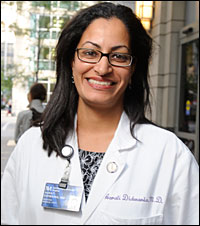STAR Lights the Way for Childhood Cancer Survivors
 |
|
Dr. Aarati Didwania |
The STAR (Survivors Taking Action & Responsibility) program at the Robert H. Lurie Comprehensive Cancer Center of Northwestern University is one of only a handful of programs in the country that focus on comprehensive health care of adults who are survivors of childhood cancer.
One in about 300 children between birth and age 20 will be diagnosed with cancer. The cure rate for children with cancer has climbed to 80 percent and, for some cancers, it may soon reach 90 percent. But when these children grow up, recent research shows two thirds of them will experience at least one late health consequence as a result of their earlier treatment.
Most childhood survivors and their internists, however, are unaware of the looming health risks. “My previous internist wasn’t trained to help me as a survivor,” said Julia Stepenske, 34, a nurse from Elmhurst, who has an enlarged, weakened heart caused by cancer treatment for lymphoma when she was 15.
“I was adrift out there. The STAR program helped save my life,” said Stepenske, whose lymphoma returned earlier this year when she was 32 weeks pregnant.
“A lot of young adults think ‘I survived cancer. That happened to me when I was a kid and I’ve moved on,’” said Aarati Didwania, MD, who directs the STAR program. “They don’t think about the treatment they got when they were young and how it could have affected them.”
But Didwania and her staff think about it plenty. They tenaciously track down patients’ health records from 10, 20, 30 or more years ago to compile those records into a clinical summary for the patient. The summary consolidates the chemotherapy drugs, radiation exposures, and surgeries that survivors have had. These details foretell the health problems that likely lie ahead and the diagnostic screenings patients need to protect them. This information also teaches patients about their past treatment and long-term health consequences.
“The effects get worse with time,” said Dr. Didwania, an assistant professor of medicine at the Feinberg School and a physician at Northwestern Memorial Hospital. “The further out patients get from their treatment, the more likely they are to develop late effects.”






